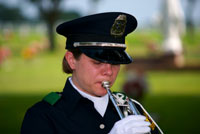Contributed by Brian Hiortdahl, Chicago, IL
Warm-up Question
Do you believe in ghosts?
His Caring Spirit Lives On
 So proclaims the title of a local newspaper article reporting the memorial services for Sean Collier, a beloved young police officer at MIT killed in the wake of the bombing at the Boston Marathon:
So proclaims the title of a local newspaper article reporting the memorial services for Sean Collier, a beloved young police officer at MIT killed in the wake of the bombing at the Boston Marathon:
http://www.sentinelandenterprise.com/local/ci_23103732/his-caring-spirit-lives
Discussion Questions
- React to the article. What feelings does it stir in you?
- Do you believe that people’s spirits continue to be present with us somehow after they die, or is that just grief’s wishful thinking? What personal experiences inform your answer?
- What is the best way for a community to honor someone special who has died?
- What similarities and differences do you see between what the mourners said about Officer Collier after his death and what Christians say about Jesus after Easter?
Scripture Texts (NRSV) for Sunday, May 26, 2013 (The Holy Trinity/First Sunday After Pentecost)
(Text links are to Oremus Bible Browser. Oremus Bible Browser is not affiliated with or supported by the Evangelical Lutheran Church in America. You can find the calendar of readings for Year C at Lectionary Readings.)
For lectionary humor and insight, check the weekly comic Agnus Day.
Gospel Reflection
This week’s gospel reading gives us the words of someone who died too young, the victim of someone else’s political statement: Jesus. On the night before his death, he tells his friends that he has so much more to tell him than he has time to say it or they have capacity at the moment to hear it, but he also promises that the Spirit of truth will come to them. Since Jesus is himself the truth (and the way and the life), the Spirit of truth is his Spirit, coming “to guide you into all the truth.” This Spirit is identified in Christian theology as the third person of the Trinity, sometimes named the Holy Ghost. In a way, the Holy Spirit is Jesus’ way of haunting us. Or, to phrase it as the news article does, “his caring spirit lives on” among us.
Yet this Spirit is more than a spook, a vapor, a legacy, or a memory. The Holy Spirit is God fully (though not bodily) present with us. It is nearly as mystifying and beyond our comprehension as the larger teaching we celebrate on Sunday that God is Trinity: one God in three persons, a unified community of generous, trusting love. Those of us who cannot fully grasp these deep truths–who cannot bear them now–can hold onto the promise that (somehow, over time) the reliable Spirit will guide us into all the truth.
Discussion Questions
- What questions puzzle you?
- Where, when, and how do you experience the living presence of God in your life, as an individual and as part of a community? What inspires you? (Do you know the etymology of the word inspire?)
- Who in your life has done the work of the Spirit, guiding you into the truth?
- Read and discuss 1 John 4:1-21, which begins: Beloved, do not believe every spirit, but test the spirits to see whether they are from God…. According to this biblical writer, how do we recognize whether a spirit is from God or not?
Activity Suggestions
- Serve as a mentor or tutor for someone with less learning or experience than you; help guide them into new truth that you know.
- Honor someone who has died, but whose life and spirit continue to teach, bless, or inspire you.
- As a group, begin planning a holy haunted house for the children in your church next Halloween. (Maybe the Church itself is really a holy haunted house!) Find fun, creative ways to trace the evidence that the Holy Spirit has been present and active there. And what about “the great cloud of witnesses,” the saints? Is Martin Luther’s spirit still there? (Remember Reformation Day.) What about the faithful members of the congregation and other Christians elsewhere who have died? (Remember All Saints Day.) What spirits continue to bless us with their presence at Holy Communion…not in fear, but in love?
Closing Prayer
Blessed Trinity, keep guiding us into the truth that you are. Shepherd us into and share with us your holy and beautiful dance of powerful life and perfect love. Grant that your caring Spirit live on in us and bless the world with your abundant grace. Amen.

